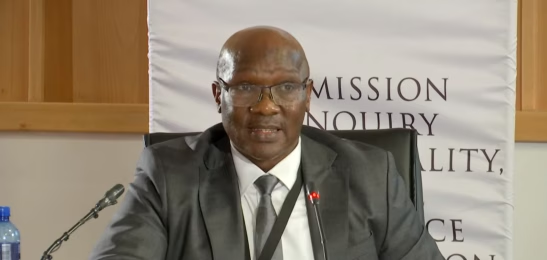The Madlanga Commission of Inquiry has heard explosive testimony from South African Police Service (SAPS) Crime Intelligence Head, Lieutenant-General Dumisani Khumalo. He alleged that the dismantling of the elite Political Killings Task Team (PKTT) was not a routine administrative decision, but the result of pressure from a powerful cartel seeking to shield itself from exposure.
According to Khumalo, senior officials acted on instructions influenced by a criminal network operating in Gauteng. He suggested that the unit was not disbanded for inefficiency, but rather because it had begun to make progress that threatened those with vested interests.
“But alongside this evidence set out in the statement, there is also considerably more evidence at my disposal that cannot be shared in a public space for the following reasons,”
Khumalo explained.
The PKTT, which specialised in investigating politically motivated killings, was dissolved in December 2024. The decision followed a directive from suspended Police Minister Senzo Mchunu, who instructed the National Commissioner, General Fannie Masemola, to disband the unit. In the directive, Mchunu maintained that the task team
“no longer added value”
to the work of the police.
Khumalo, however, challenged this version of events. His testimony suggested that the unit’s work was beginning to uncover the depth of criminal infiltration in state structures, and that the timing of its closure was far from coincidental.
The General highlighted that much of the information he holds cannot be disclosed in public hearings due to security risks. He warned that revealing operational details could compromise both ongoing investigations and the safety of informants.
“Sharing some of the evidence will expose our methodologies, will expose our informants, the resources, taking also into consideration the high risk, the current threat assessment of the Gauteng organised crime, Gauteng counterintelligence investigation,”
he said.
He further noted that disclosure of certain findings would place active operations in jeopardy.
“As it’s still ongoing, also sharing some of the information will compromise the same ongoing investigation.”
Khumalo emphasised the importance of balancing transparency with the protection of sensitive intelligence. He cautioned that some matters must remain off the record to ensure the survival of sources and the integrity of the investigations.
The testimony has sparked difficult questions about the extent of political interference in law enforcement. If the PKTT was making progress, as Khumalo suggested, the decision to shut it down could represent more than a simple disagreement over policing priorities. It raises concerns about whether organised crime has succeeded in influencing the highest levels of authority.
Khumalo’s statement has cast a spotlight on the relationship between politics and policing, underscoring the challenges faced by officers who attempt to investigate powerful interests. For the public, the issue remains whether the fight against political killings has been undermined, and if so, by whom.

















